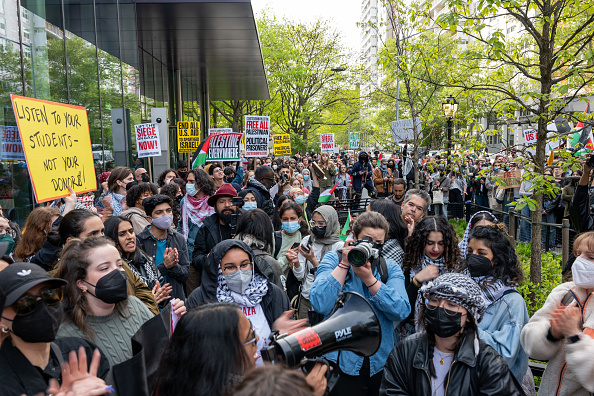As student protests against Israel’s war on Gaza continue to persist across US university campuses, many have drawn parallels to the anti-Vietnam War protests of the 1960s.
Since Columbia University students launched their encampment in April, more than 100 other campuses in the US have joined with similar actions. It has prompted protests to mushroom in other countries, including the UK.
Footage of students forcibly removed by police, particularly with protestors at Columbia University, has further galvanised support amongst the youth.
The students are protesting the war’s death toll and want universities to end financial investments linked to the Israeli government and military.
A veteran of the 1968 protests against the Vietnam War at Columbia University, Beth Massey, was at the university recently urging students not to fear the security crackdown.
In a news conference on Thursday, President Joe Biden said “order must prevail” in the campuses, adding that free speech and rule of law “must be upheld” but “violent protest is not protected.”
But commentators highlight that politicians have often found themselves on the wrong side of history during previous campus movements, especially during the Vietnam War.
In 1968, students occupied Hamilton Hall at Columbia University to protest against the war. Just like now, the president back then also called the police, who violently violently cleared the building.
Meanwhile, in the 1970s, student protest movements forced universities to divest from South Africa’s apartheid regime.
Students on “right side of history”
Following Biden’s speech, columnist Wajahat Ali posted on X: “If Biden really believes his speech that means his administration would have been against the Vietnam War protests, civil rights protests, anti apartheid protests, and war on Iraq protests.
He added: “All those students btw were on the right side of history and made people uncomfortable.”
Academic Dr H.A Hellyer said those who have vilified pro-Palestinian protestors will regret their stance.
“I daresay the Palestine protests in American universities of 2024 will go down in history as comparable to those protesting the Vietnam war and support for the anti-apartheid movement. And a lot of people will eventually be very embarrassed to say they demonised those protests,” he posted on X.
Journalist Owen Jones and others have pointed out that during the Vietnam War protests, most Americans supported the war, but they were proven wrong.
“Today’s protests against Israel’s genocide, meanwhile, are far more on the side of public opinion, and far more quickly, than Vietnam,” Jones said on X.
“A contrast is being made with Vietnam protests because they were vindicated by history,” he adds. “As these protests will be too!”
Author & scholar of religion Nathan Lean said on X: “In virtually every major protest challenging US policies — from Jim Crow to Vietnam — students have been agents of positive change. And in virtually every case, the government and media elite have vilified them as ignorant, external actors and squashed them.”
Violence from pro-Israel protestors
Although some student protesters have been accused of violence, critics have also blamed police assaults and agitation from far-right and pro-Israel groups for instigating conflicts.
A counter-protester jumps up and down and hoots like a monkey toward a protester who was live-streaming on her phone at @OleMiss today.
Chants of “lock her up” as the Dean of Students (@marsh_brent) and multiple law enforcement agencies regain order. pic.twitter.com/fCU3hTioVL
— Stacey J. Spiehler (@StaceyJSpiehler) May 3, 2024
Statement from UCLA Hillel makes clear violence was initiated by pro-Israel outsiders. “We can not have a clearer ask for the off-campus Jewish community: stay off our campus. Do not fund any actions on campus. Do not protest on campus. Your actions are harming Jewish students.” https://t.co/4M5ioZxgBJ
— Corinne Low (@femonomics) May 3, 2024
The LA Times reported that four journalists were attacked by pro-Israel counter-protesters on the UCLA campus on Wednesday.
The wave of activism in the US has prompted students in the UK to follow suit.
In Leeds, Newcastle and Bristol, students set up tents outside university buildings and student groups in other universities followed suit.
Elsewhere, marches and rallies organised by student activists have expressed outrage over the Israeli bombings.
In the UK, the large protest marches in London and other major cities have dominated the spotlight but a quieter student-led movement has began to also take root on campuses.












